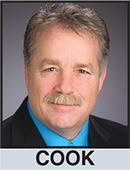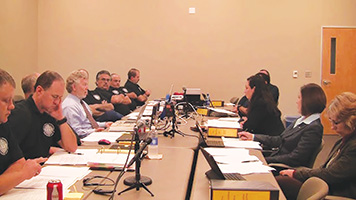California’s Grand Experiment
 By DAVID A. COOK
By DAVID A. COOK
President
 After a relaxing Easter weekend made possible by the people working in our local retail grocery stores, I found myself scrolling around recent news on my computer when I realized that Monday, April 1, 2024, is a very important date.
After a relaxing Easter weekend made possible by the people working in our local retail grocery stores, I found myself scrolling around recent news on my computer when I realized that Monday, April 1, 2024, is a very important date.
No, it’s not because it’s another chance for the most mischievous people in our lives to try to pull one over our eyes for April Fool’s Day. It’s because April 1 is when California’s minimum wage, aimed at most fast food workers, increased.
Prior to April 1, the industry minimum wage was $16 an hour, an especially low number when you consider the soaring costs-of-living in a state boasting the fifth largest economy in the world. The new $20 an hour minimum wage is primarily focused on fast food workers. Approximately half a million workers will see their wages go up as a direct result of this law, which specifically focuses on employees working for fast food chains with 60 or more nationwide locations in an effort to reduce harm to any smaller business operations.
CALIFORNIA FAST FOOD COUNCIL
Another element of the law that gets much less attention, but can potentially be even more impactful for workers, is that the law increasing the wage also creates the California Fast Food Council.
The council is comprised of workers, union officials and franchise owners. It will be empowered to set wage level increases for fast food workers across the state. The group’s meetings are public and will also seek to create rules and regulations on workplace standards and safety for all fast food workers in the state. This council will effectively give the power of union bargaining to hundreds of thousands of workers in the mostly non-union fast food industry.
For those familiar with some of the nuts and bolts of Labor law, you probably know that councils like the one established in California are especially popular in European countries, where entire industries are regulated in this fashion: unions, workers and employers working together to establish wage rates and other standards. It’s also why workers in those countries tend to enjoy higher wages and better workplace benefits than many of their non-union counterparts in the U.S. This kind of industry-wide bargaining ensures that wage increases and benefits are applied across all employers.
This means that, unlike here in the U.S., employers with union workforces can’t point to their non-union competitors and claim they have an unfair disadvantage because of the extra benefits they provide in their union contracts.
GRANDEST EXPERIMENT
The establishment of this council is, in many ways, the grandest experiment of its kind in modern America.
California, an economic powerhouse home to millions and millions of people, is attempting to find a way to bring workers, union officials and business owners together to create standards and wages impacting hundreds of thousands of workers across one industry that is notorious for low wages and minimal benefits: fast food.
Raising minimum wages for workers is good, and it’s a policy many of us in Labor will continue to passionately support. But that doesn’t mean the issue is a simple one. Workers are chronically underpaid in this industry and many others — you can’t deny that. However, some of the largest operators in fast food structure their franchise system in such a way that puts all of the risk on the shoulders of franchise owners and operators while still collecting a hefty chunk of their profits. Franchise owners are not usually multi-millionaires with private jets and cash to burn. Many of them are Middle Class people that invest significant amounts of their time and money into one or a small number of locations, and if those locations fail, you can rest assure it won’t be McDonald’s that feels the financial sting.
So how do we balance the need to pass laws that force companies to do the right thing and pay their employees a fair wage for a hard day’s work without forcing franchise owners into an impossible task?
I don’t pretend to know the answer to that question, but I know that creating this fast food council is the first step in answering questions like it. This council has only met once so far ahead of this law being implemented, and we will learn over time how effective it can or can’t be. Like the first humans fired into space, they’ll probably have to learn to improvise and deal with challenges on the fly in a high-stakes moment.
CREATIVE SOLUTIONS
These councils will function on the precise principles that make collective bargaining for union workers so valuable. Just like our own bargaining committees here in UFCW Local 655, it is putting workers, union officials and employers in one room and requiring them to come up with creative solutions that, ideally, will benefit everyone in that room.
All the way back in 1932, U.S. Supreme Court Justice Louis Brandeis coined the idea that one of the things that made America such a unique place is that our 50 states can all function as 50 different “laboratories” for democracy. We do not know how this experiment in California will work. Like so much work done in countless labs around the world, we don’t always know what will come when the tests begin. We don’t know what we’ll get right or what we’ll learn, but the very act of experimentation is inherently about walking firmly into the unknown.
The possibilities are genuinely thrilling, and it may help other states learn how to establish similar bodies that will help move American workers a little closer to the American Dream itself.


Leave a Reply